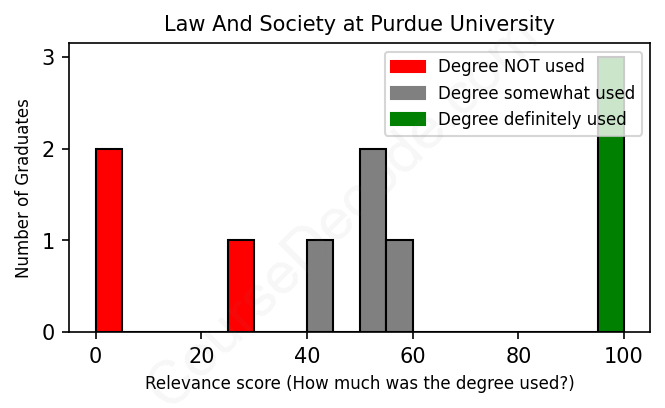
First, some facts. Of the Law And Society graduates from Purdue University we've analyzed , here's how many have used (or NOT used) their degree in their career:

These are estimates based on AI analysis of 10 LinkedIn profiles (see below).
The verdict? Significantly below average. Overall, with an average relevance score of 52%, Law And Society graduates from Purdue University have a much lower likelihood (-15%) of finding work in this field compared to the average graduate across all fields:
And for comparison, here's the chart for all profiles we've looked at across all degrees.
Also, after graduating, 40% of these graduates have pursued further education other than another Bachelor's degree (such as a Masters degree or other), compared to the average across all profiles of 35%. This suggests you may need more than just a Bachelors degree to be competitive as a Law And Society graduate.
See the details:
|
Relevance score: 100% We think this person has gone into a career highly relevant to their degree. We think this person has gone into a career highly relevant to their degree.
DEGREE INFOGraduated in 2011 from Purdue University with a Bachelor of Liberal Arts in Law And Society. Also pursued further education since (see below). JOB HISTORY SINCE GRADUATIONParalegal Hoffman, Luhman & Masson, PC Apr 2014 - Present FURTHER DEGREES DONE SINCE GRADUATINGAssociate's degreeIvy Tech Community College-Lafayette 2011 - 2012 ABOUTNo information provided. |
The top 10 most common jobs done by the graduates we've analyzed (ranked most common to least) are:
So, when looking at the types of jobs that graduates with a degree in Law And Society from Purdue University have done, it’s clear there’s quite a mix. Many of them ended up in roles directly connected to the legal field, like police officers, paralegals, and probation officers. These jobs definitely tap into the knowledge of law and societal structures learned in their degree. For instance, both police officers and probation officers handle issues that require solid understanding of legal principles and how society functions, making them super relevant to what they studied. On the flip side, we also see graduates taking roles that have little to do with law or societal issues, like staffing consultants, property managers, and various management positions that focus more on business operations than on the legal aspects of society.
Overall, while some graduates have scored jobs that make full use of their Law And Society background, like corrections counselors and medicolegal death investigators, there’s a noticeable number in positions that don't really connect to their studies. This suggests that while a Law And Society degree can lead to relevant career paths, it doesn't necessarily limit graduates to only legal-related jobs. Many have branched into diverse fields, which shows that the skills gained from their education can be quite transferable, even if they are not directly related to law or society.
Here is a visual representation of the most common words in job titles for Law And Society graduates (this is across all Law And Society graduates we've analyzed, not just those who went to Purdue University):

Based on the career trajectories of these graduates from Purdue University who studied Law and Society, it seems like they have embarked on a mixed bag of career paths. Many of the graduates appear to start their careers in law enforcement or legal support roles, like becoming police officers or paralegals, which makes sense given their background in Law and Society. For example, graduates who became police officers or corrections counselors tended to stay in these fields, suggesting a strong inclination towards public service or criminal justice right after finishing their degree.
However, as time goes by, the picture becomes a bit more varied. While some individuals have continued to thrive in roles that are directly linked to law, like a medicolegal death investigator or a probation officer, others have transitioned into seemingly unrelated areas, such as recruitment or even sales management at companies like T-Mobile. This indicates that while a solid number of graduates are finding success in fields closely tied to their studies, there's also a trend of branching out into different industries that don't necessarily call for their Law and Society degree specifically. So, in summary, it looks like there are good prospects in legal and law enforcement careers, but many graduates also diversify into other sectors over time, reflecting a broader range of job opportunities.
Honestly, a Bachelor's degree in Law and Society can be a mixed bag in terms of difficulty, and it really depends on your interests and strengths. At Purdue, you’ll dive into a variety of topics that blend law, politics, sociology, and ethics, which can be super engaging if you enjoy those subjects. Some students find it easier because the focus isn’t just on hard-core legal theory, but more on understanding the impact of law in society. However, it can get challenging when you’re tackling research papers or in-depth analyses. Overall, it's probably about average in terms of difficulty compared to other liberal arts majors, but staying organized and keeping up with readings is definitely key to success!
Most commonly, in the LinkedIn profiles we've looked at, it takes people 4 years to finish a Bachelor degree in Law And Society.
Looking at these Law and Society graduates from Purdue, it seems like they’re all kind of in the mixed bag when it comes to money. You've got folks like the police officer and the paralegal who probably aren't raking in the big bucks, but they seem to have stable jobs. The property manager and the recruiter roles probably offer decent salaries, especially as you move up in those careers. Then there’s the T-Mobile guy who seems to have climbed the ladder pretty quickly, hinting at some better earnings – sales jobs can really pay well if you play your cards right. On the flip side, the more entry-level roles, like the greeter or the logistics consultant, might not be bringing in much at all. Overall, while some are likely doing alright, others might be struggling a bit to make ends meet, so it really varies from person to person!
Here is a visual representation of the most common words seen in the "about" section of LinkedIn profiles who have a Bachelor degree in Law And Society (this is across all Law And Society graduates we've analyzed, not just those who went to Purdue University). This may or may not be useful:

Here are all colleges offering a Bachelor degree in Law And Society (ordered by the average relevance score of their Law And Society graduates, best to worst) where we have analyzed at least 10 of their graduates:
| College | Score | Count |
|---|---|---|
 Purdue University Purdue University
|
52 | 10 |